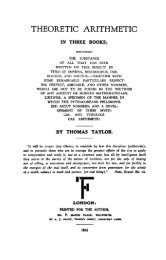The Mystical Hymns of Orpheus - Platonic Philosophy
The Mystical Hymns of Orpheus - Platonic Philosophy
The Mystical Hymns of Orpheus - Platonic Philosophy
Create successful ePaper yourself
Turn your PDF publications into a flip-book with our unique Google optimized e-Paper software.
ADDITIONAL NOTES.<br />
respect to the two coordinations, the natures which are<br />
coordinate with the one, he passes by in silence, but those<br />
alone which are coordinate with the indefinite duad, he<br />
unfolds through genealogy. And on this account Plato<br />
now thinks Hesiod deserves to be mentioned, for passing<br />
by the natures prior to Heaven, as being ineffable. For<br />
this also is indicated concerning them by the Oracles,<br />
which likewise add, " they possess mystic silence." And<br />
Socrates himself, in the Phsdrus, calls the intellectual per-<br />
ception <strong>of</strong> them pvqcis and eromE(a, in which nearly the<br />
whole business is ineffable and unknown.<br />
<strong>The</strong> theology <strong>of</strong> Hesiod from the monad Rhea produces,<br />
according to things which are more excellent in the coordi-<br />
nation, Vesta ; but according to those which are subordi-<br />
nate, Juno; and according to those which subsist between,<br />
Ceres. But according to <strong>Orpheus</strong>, Ceres is in a certain<br />
respect the same with the whole <strong>of</strong> vivification, and in a<br />
certain respect is not the same. For on high she is Rhea,<br />
but below, in conjunction with Jupiter, she is Ceres: for<br />
here the things begotten are similar to the begetters, and<br />
are nearly the same.<br />
Again, we ought to receive with caution what is now<br />
said concerning effiuxions and motions. For Socrates does<br />
not descend to the material flowing <strong>of</strong> Heraclitus ; for<br />
this is false %, and unworthy the dianoetic conceptions <strong>of</strong><br />
Plato. But since it is lawful to interpret things divine<br />
analogously, through appropriate images, Socrates very pro-<br />
perly assimilates fontal and Saturnian deities to streams ;<br />
in so doing jesting and at the same time acting seriously,<br />
because good is always derived as it were in streams from<br />
on high, to things below. Hence, according to the image<br />
<strong>of</strong> rivers, after the fontal deities, who eternally devolve<br />
streams <strong>of</strong> good, the deities who subsist as principles are<br />
22 That ie to say, it is false to assert <strong>of</strong> intellectual and divine natures.<br />
that they are in a perpetual flux; for they are eternally stable themselves,<br />
and are the sources <strong>of</strong> stability to other things.

















